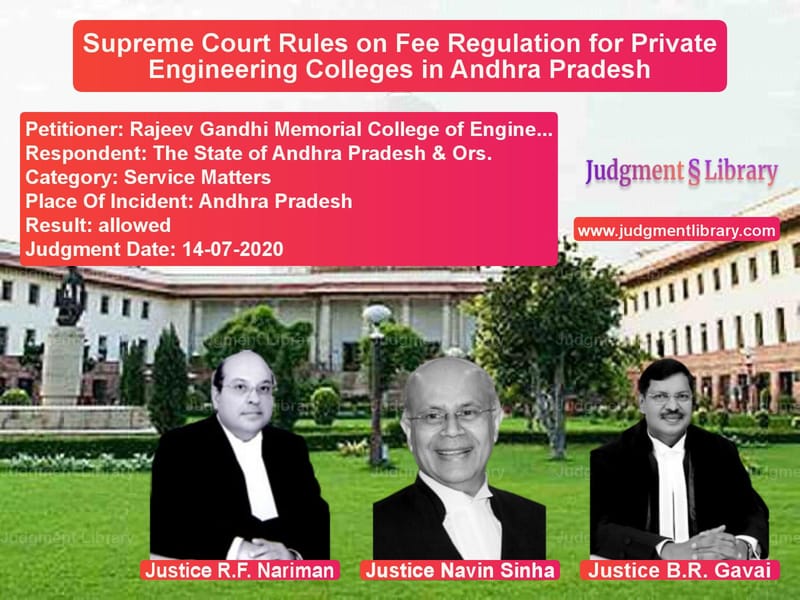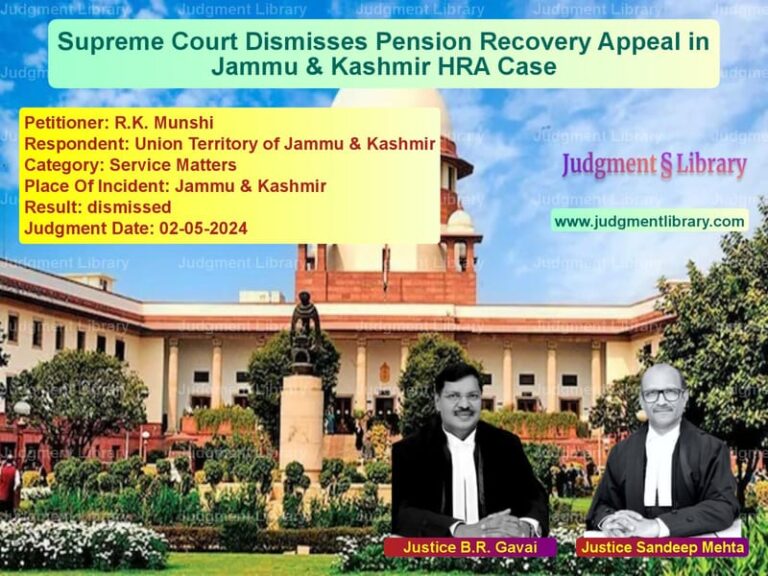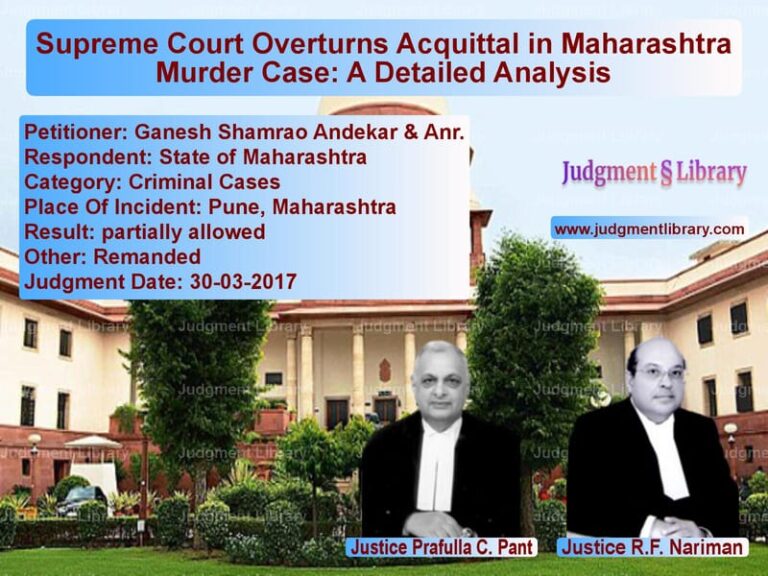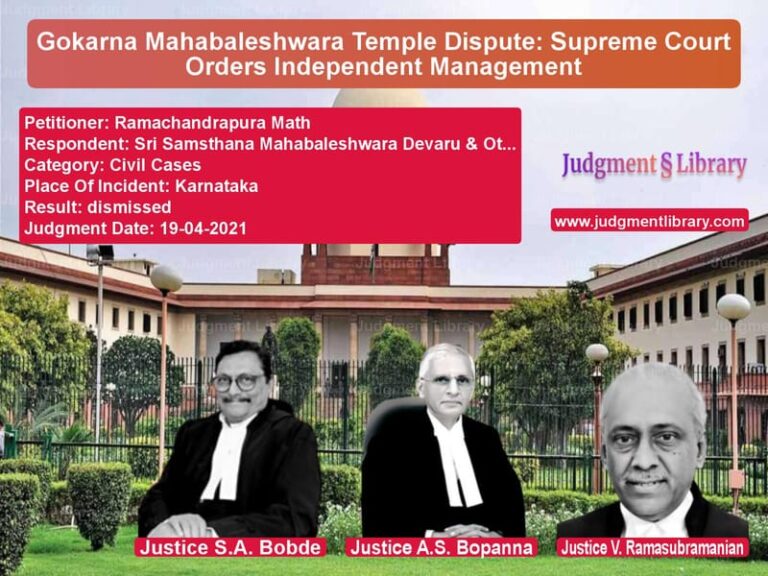Supreme Court Rules on Fee Regulation for Private Engineering Colleges in Andhra Pradesh
The Supreme Court of India, in the case of Rajeev Gandhi Memorial College of Engineering and Technology & Anr. vs. The State of Andhra Pradesh & Ors., addressed the legality of fee fixation for private unaided institutions in Andhra Pradesh. The judgment clarifies the application of the Andhra Pradesh Educational Institutions (Regulation of Admission and Prohibition of Capitation Fee) Act, 1983, and emphasizes procedural compliance in fee determination.
The case arose when private engineering colleges challenged a government order extending the previously fixed fee structure for another term without following the statutory procedure prescribed under Rule 4 of the Act. The Supreme Court struck down this decision, upholding the right of institutions to seek a fair revision of fees.
Background of the Case
Rajeev Gandhi Memorial College and another private college filed petitions against the Andhra Pradesh government’s decision to continue the fee structure from the previous academic block (2016-2019) into the next block period (2019-2022) without conducting a review process. The colleges had proposed higher fees based on increased operational costs but were denied the opportunity for a revision.
The petitioners contended that Rule 4 of the Act mandates the Andhra Pradesh Fee Regulatory Committee (AFRC) to assess and determine fees based on various institutional factors, such as infrastructure, administrative costs, and reasonable surplus for growth. However, the state government bypassed this requirement and issued an interim order extending the old fee structure.
Arguments of the Petitioner
The private engineering colleges, through their legal counsel, argued:
- The government’s order extending the old fee violated Rule 4, which mandates a thorough fee assessment before a new term begins.
- The Andhra Pradesh High Court’s decision to modify the single judge’s order and allow partial collection of increased fees with bank guarantees was arbitrary.
- The colleges had submitted necessary documents justifying the fee revision, but their concerns were ignored.
- The failure to conduct a proper review and fix fair fees adversely impacted the financial sustainability of private educational institutions.
Arguments of the Respondent
The State of Andhra Pradesh and the AFRC contended:
- The interim extension of fees was a temporary measure to avoid disruption in the admission process.
- The colleges could charge additional fees later if approved, subject to government notification.
- Allowing an immediate hike in fees without regulatory assessment could lead to exploitation of students.
- The policy of maintaining fee continuity ensured stability in higher education institutions.
Supreme Court’s Key Findings
1. Requirement of Fee Review Under Rule 4
The Court held that the government’s action violated the prescribed procedure and stated:
“The interim fixation of fees without following the statutory framework is unlawful and infringes upon the rights of educational institutions.”
2. Role of the Fee Regulatory Committee
The Court emphasized that the AFRC is the designated authority for fee determination and must act independently. It ruled:
“The government cannot unilaterally extend the fee structure without consulting the statutory regulatory body.”
3. Rights of Private Educational Institutions
Reaffirming the rights of private unaided colleges, the Court noted:
“Educational institutions are entitled to a reasonable surplus to maintain quality education, and fee fixation must reflect actual costs and development needs.”
4. Setting Aside the High Court’s Order
The Supreme Court overturned the Andhra Pradesh High Court’s modification of the single judge’s order, ruling that the colleges were entitled to collect revised fees once a proper assessment was completed.
Final Judgment
The Supreme Court:
- Allowed the appeal and reinstated the single judge’s order suspending the government’s fee extension.
- Directed the AFRC to complete the fee assessment process in accordance with Rule 4.
- Ordered that the revised fees, once determined, would apply to all students retrospectively.
- Clarified that institutions cannot collect increased fees until the official notification is issued.
Key Takeaways from the Judgment
- Fee fixation for private educational institutions must follow the statutory process.
- State governments cannot unilaterally extend old fee structures without due diligence.
- Regulatory bodies like the AFRC must function independently in assessing educational costs.
- Private institutions are entitled to charge fair fees but must comply with prescribed norms.
Conclusion
The Supreme Court’s ruling in Rajeev Gandhi Memorial College of Engineering and Technology & Anr. vs. The State of Andhra Pradesh & Ors. upholds the procedural integrity of fee regulation in higher education. The judgment ensures that private institutions are not arbitrarily denied their right to fair compensation while balancing the need to prevent excessive commercialization of education.
Petitioner Name: Rajeev Gandhi Memorial College of Engineering and Technology & Anr..Respondent Name: The State of Andhra Pradesh & Ors..Judgment By: Justice R.F. Nariman, Justice Navin Sinha, Justice B.R. Gavai.Place Of Incident: Andhra Pradesh.Judgment Date: 14-07-2020.
Don’t miss out on the full details! Download the complete judgment in PDF format below and gain valuable insights instantly!
Download Judgment: Rajeev Gandhi Memori vs The State of Andhra Supreme Court of India Judgment Dated 14-07-2020.pdf
Direct Downlaod Judgment: Direct downlaod this Judgment
See all petitions in Education Related Cases
See all petitions in Public Interest Litigation
See all petitions in Recruitment Policies
See all petitions in Judgment by Rohinton Fali Nariman
See all petitions in Judgment by Navin Sinha
See all petitions in Judgment by B R Gavai
See all petitions in allowed
See all petitions in supreme court of India judgments July 2020
See all petitions in 2020 judgments
See all posts in Service Matters Category
See all allowed petitions in Service Matters Category
See all Dismissed petitions in Service Matters Category
See all partially allowed petitions in Service Matters Category







